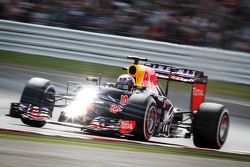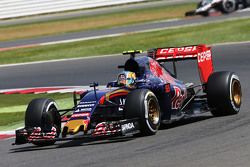Analysis: Can Renault still salvage its F1 season?
What's gone wrong at Renault this year? And what is the French manufacturer doing to bounce back from its poor season? Adam Cooper talks to tech chief Rob White about Renault's plans.

Photo by: XPB Images



























As speculation continues about Renault's longer-term F1 plans, the French company has the more immediate problem of getting through the remainder of what has been a difficult season.
Under pressure from Red Bull on the one side and the company's main board on the other, the guys from Renault Sport have been on a hiding to nothing, but they still have a chance to redeem themselves.
The earlier reliability problems appear to have been addressed, and now the focus has turned to improving performance.
It's a process that inevitably takes time, and thus it is still not known exactly when those upgrades will be seen in the back of a Red Bull or Toro Rosso.
More penalties
The extra problem is that introducing new power unit elements pushes the drivers concerned further into the realm of grid penalties.
Daniel Ricciardo, Daniil Kvyat and Max Verstappen have already used their fifth Internal Combustion Engines, and thus any new V6 will trigger a 10-place penalty.
The two RBR men are also on the bubble for further penalties should they take a fifth turbo. It's inevitable that they will need to make changes, and the big question is when and where that will happen.
Where did it all go wrong?
So what's gone wrong for the folk from Viry this year? One of the key men in the spotlight is chief technical officer Rob White.
"We were on the back foot right at the beginning of the season," White told Motorsport.com. "Because we had some incidents right from the first session in Australia. We knew that they would have a knock-on effect later, although we didn't know the full extent of it.
"The first signs of trouble were just before the season, in stripping down the engines post-Barcelona [the February test]. The trouble was clearly in the area of the piston.
"We did a fix which turned out to be insufficient, and the worst of it played out over the weekends of China and Bahrain. We subsequently made a second change, by which time we'd properly understood and moved forward.
"That's been successful in terms of stabilising the reliability. The engines that we've introduced since Monaco have all been in the spec with the safer pistons, and there's been no related trouble anywhere since."
Performance sacrificed over reliability
White is adamant that addressing reliability sucked resources away from the quest for performance.
"The obvious problem is that we are now in July, and the resource allocation necessary to deal with reliability was what should have been working on in-season performance.
"So we've lost the time, and the juggling act now is to complete the development items that have been work-in-progress. And the question of when to deploy them now takes on a further dimension, which is performance opportunity versus sporting penalties.
"Only one of our four drivers remains on course to finish the season with only four sets of IC engine pieces [Carlos Sainz]. So any unplanned engine introduction from now on is penalty.
"Our intention is to complete the development and deploy before the end of the season the changes that should have arrived mid-season. But now the exact deployment become a slightly more challenging thing."
There are several factors to consider, most obviously the fact that at certain races grid penalties are more expensive than at others.
You don't want to be penalised in Hungary or Singapore, for example, where passing is all but impossible. Belgium on the other hand potentially offers more opportunity to make progress from the back, especially if weather plays a part.
"The event at which you might trade penalty for performance - you can be defensive about it or offensive about it," White added. "Probably it needs to be played out over a horizon of several races, not one. It's clear that you wouldn't want to have an unscheduled change during the Hungary weekend.
"It becomes a thing that has to be operated from two ends, you have to count back from the end of the season as well, because if you're going to introduce an engine the last moment at which you can introduce an engine is a count back from the end rather than a count forward from now."
In other words there's no point in scheduling a new upgraded engine for the last couple of races, when you can't make proper use of it.
It's also clear that there won't be an upgrade until at least Belgium, at the end of the summer break: "The timing is such that there are no new engines planned before the Spa/Monza horizon."
Timing key
That brings up an interesting issue, and one that will put Renault under some pressure in Hungary.
If any of the drivers experience a V6 failure in the build-up to this weekend's race a current spec replacement will have to be deployed. And in theory that will have to be used for the next few races, and thus the driver concerned won't have the chance to upgrade until its life has been used up.
"Exactly," says White. "There's no hiding from the fact that in the lead up to a new spec becoming available and valid you're vulnerable if there's an incident that causes you to put a previous spec in. And that's exactly the thing that caused us trouble at the beginning of the year.
"If you replay what happened in Australia, we had an incident on Ricciardo's car which was a relatively minor reliability issue, but which nevertheless wrote-off an IC engine, an IC engine that was in our preferred spec – that was our start-of-the-year best spec.
"We then put a spec in that had the same performance, but which didn't have the reliability fix in it. We knew that had a short life, so we burned two engines and we knew that the second engine wasn't great.
"And that was before we had the trouble with the subsequent spec which was insufficient to cure the problem that had cropped up..."
The big problem is the lead time required for any changes to the power unit. Even when the engineers know what to do, races inexorably slip by before any updates can be implemented on track.
"The management of the development cycle is extremely delicate. The real lead time of diagnosing, understanding, designing and making the new bit is part of it, but it's not the whole thing. It then becomes a cycle of approving and introducing.
"The real life cycle is months, rather than days or even weeks. We now know that we've got to bring the performance to the car, get it into the car asap. In real life asap is after the summer break, and the extent of the change now has a kind of tactical/sporting dimension associated with penalties."
Renault does at least have a handy 12 power unit upgrade tokens to play with, having not yet deployed any during the season, in contrast to Honda and Ferrari.
"The bad news is that one of the resources which is most precious, which is of course time, has been lost. We can't recover it. The good news is that one of the resources that remains intact is the token allocation, which we shouldn't get too hung up on.
"The way things have worked out, it's no longer an obstacle. We now have the same tokens that we started the year with, so following the very short term and reactive situation following the reliability incidents the token resource remains available to us, and won't hold us back."
So how will those tokens be spent?
"I think there are 40-something separate lines in the token table, and 60-something opportunities to spend tokens. Quite a lot of those don't have any performance potential in them.
"The place where there is most performance potential is the fundamental stuff, combustion, cylinder heads, exhausts, inlets, turbos, that's where the action is.
"If you add up all of the tokens in those lines it comes to around about 12, which is about what we've got left. If we did all of that in one go, we wouldn't do anything else. If we didn't quite do all of that, we might a little bit of something else, but it wouldn't be very significant."
So could a new turbo be slotted independently of a new V6, for example? White says not.
"The honest answer is that the reason for doing that kind of stuff is for start-to-end optimisation. It's conceivable that you would do them individually, but it's more likely that they will be optimised as a package."
Thus the bottom line is that a revised Renault V6/turbo combo is set to be introduced either at, or at some point, after the Belgian GP – and when it comes it will represent a 15-place hit for Ricciardo and Kvyat.
Whether it brings enough performance to move the cars up the grid remains to be seen.
Be part of Motorsport community
Join the conversationShare Or Save This Story
Subscribe and access Motorsport.com with your ad-blocker.
From Formula 1 to MotoGP we report straight from the paddock because we love our sport, just like you. In order to keep delivering our expert journalism, our website uses advertising. Still, we want to give you the opportunity to enjoy an ad-free and tracker-free website and to continue using your adblocker.



















Top Comments